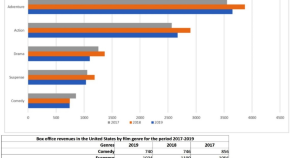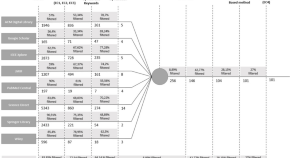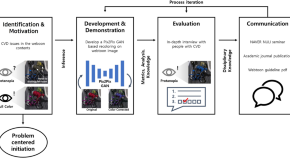Enhancing statistical chart accessibility for people with low vision: insights from a user test
Authors (first, second and last of 4)

Collection
In today's connected world, there are numerous situations in which people need to make use of devices with a human-computer interface. The variety of interfaces, with approaches such as multimodal interfaces, virtual reality, augmented reality and many others, makes it difficult to take advantage of the knowledge and techniques from working with traditional interfaces. Thus, it is necessary to approach working with these new interfaces from new points of view. Of course, accessibility is a key point in the success of interfaces, and the proposed approaches must take into account that interfaces need to be accessible.
This work includes the design and evaluation of novel interfaces to achieve accessibility. The design must take into account accessibility guidelines that guarantee that the interfaces will be inclusive and that no one will be excluded from using them. Evaluation, on the other hand, implies having the necessary means to verify that an interface meets the accessibility requirements expected in a work of this type.
Thus, this special issue will welcome contributions that address new perspectives in the design and evaluation of human-computer interfaces, always from the point of view of interfaces that seek accessibility.
Main topics
This special issue will focus on research on the design and evaluation of accessible human-computer interfaces. Contributions are solicited in, but not limited to, the following topics:
● Designing and evaluating interfaces for people with disabilities. ● Designing and evaluating interfaces for older adults. ● Accessibility and user experience (UX). ● Web accessibility. ● Accessibility in data visualization. ● Guidelines for accessibility.
This special issue will include:
● Extended papers accepted at the XXII International Conference on Human-Computer Interaction, Interacción 2022, held in Teruel, Spain.
● Original research contributions related to the main topics
For papers presented at the above-mentioned conference, the updated version must be substantially enhanced and enriched, comprising at least 70% new, previously unpublished material.
Deadline for submission of papers: 31st August 2023
Guest Editors
● Jesús Gallardo (University of Zaragoza, jesus.gallardo@unizar.es)
● Sergio Albiol (University of Zaragoza, salbiol@unizar.es)
● Sandra Baldassarri (University of Zaragoza, sandra@unizar.es)
● Silvia Hernández (University of Zaragoza, silviahm@unizar.es)
● Raquel Lacuesta (University of Zaragoza, lacuesta@unizar.es)
● Arcadio Reyes-Lecuona (University of Málaga, areyes@uma.es)
Submission guidelines
Submissions should be prepared according to the author instructions available at the journal homepage, https://www.springer.com/10209 by following the link to the “Instructions for Authors”. Typical length of a manuscript is 20-30 pages. Initial manuscripts must be submitted electronically in the form of PDF file through the Springer Editorial Management System available at https://submission.nature.com/new-submission/10209/3 or use the "Submit to this journal" link on this page. During the submission process, please select the Special Issue title in the Collection field of the Details tab.Reviewing process
All papers will be peer reviewed by three reviewers, experts in the field, appointed by the Guest Editors of the issue in consultation with the Editors-in-Chief of the Journal.
Copyright information
Submission of an article implies that:
● The work described has not been published before, except in form of an abstract or as part of a published lecture, review, or thesis;
● It is not under consideration for publication elsewhere.
For further information, please, refer to the “Copyright information” section on the Website of the UAIS Journal.
Raquel Lacuesta has been the Lecturer of Computer Science with Zaragoza University. Her main topics of research are security and auto-configuration on ad hoc and spontaneous networks, design.
Arcadio Reyes-Lecuona is an Associate Professor at the University of Malaga and the Head of the DIANA research group. Arcadio Reyes-Lecuona’s research interests are in 3D audio and HCI in VR, including sonic interaction.
Jesús Gallardo is an associate professor at the Politechnical School of Teruel, Universidad de Zaragoza, Spain. His research interests include Human-Computer Interaction, Computer Supported Collaborative Work and Video Game Development.
Assistant Professor at the Computer Science and Systems Engineering Department, Escuela de Ingeniería y Arquitectura (EINA), Universidad de Zaragoza, Spain. Special interests in natural interaction, virtual humans, affective computing, accesibility, and computer graphics/real-time animation/deformable models.
Silvia Hernández is a professor of fine arts at the Faculty of Social and Human Sciences of Teruel (University of Zaragoza, Spain). She works in the fields of design, illustration, technology, and sustainability.
Sergio Albiol-Pérez is an Assistant Professor at the Dept. of Computer Science and Systems Engineering, Universidad de Zaragoza in Teruel, Spain. His reserach interests focus on patients with serious injuries and illnesses by using virtua rehabilitation techniques, in the area of virtual motor rehabilitation, and systems based on interaction for the recovery of mental disorders.







